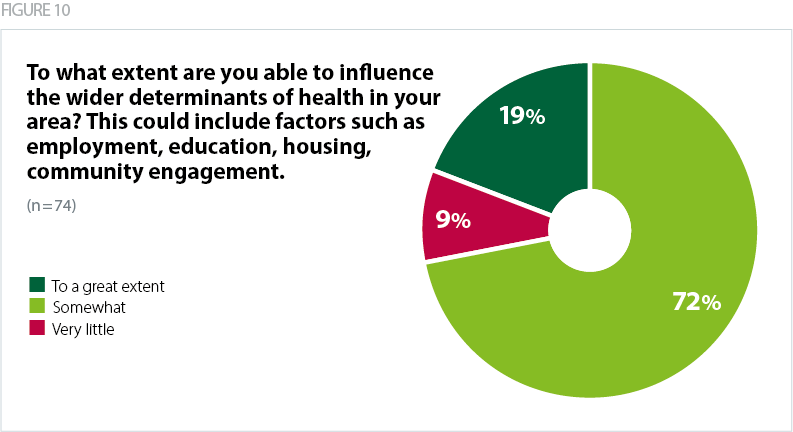Research has shown that the main drivers of health inequalities are the wider determinants of health - the environment people live in, access to employment, and the kind of start they had in life (Bibby, 2018). Targeting action on the wider determinants of health is often considered out of the scope of NHS services and more naturally within the domain of national government and local authorities. However, through their role as anchor institutions, trusts can positively influence the local social, economic and environmental conditions for population health (NHS Providers, 2023b).
Trusts are overwhelmingly positive about their ability to influence the wider determinants of health in their area – with 72% of respondents reporting that they 'somewhat' influence these factors and a further 9% reporting they can influence 'to a great extent'. Clearly, there is more work to be done to shift the extent to which trusts feel they can have an influence.

"I meet the leaders of partner organisations every 2 months to discuss health inequalities and shared priorities. Our health inequalities strategy is explicit about our anchor institution responsibilities."
Feedback from executive leads revealed a range of good practice in anchor institution working. Some trusts have embedded anchor principles within their organisational strategy documents and are embedding these across different divisions within their organisation, including corporate services. One exemplar trust was working to gain Marmot Trust status. Another trust mentioned that they have developed a clean air policy to tackle their organisation's contribution to climate change.
For the majority of trusts the scope of their anchor work is mostly focused on the provision of employment opportunities - largely around improving access to work for local people. This has included providing training opportunities in areas where there are high health inequalities, working with partners to provide a skills academy for entry level jobs, hosting recruitment events, and simplifying application processes to remove barriers that some individuals may face. This is an important contribution that trusts can make, however there are a range of other ways that trusts can positively influence their local economy – such as through procurement, housing, and access to green spaces.
"We do try to be a good partner in our system. We are a key employer and have hyper-local recruitment to get people into work who would ordinarily not consider the NHS. We have made significant strides in "growing our own" providing local educational and training opportunities to improve employment prospects (and help our workforce shortages.) We speak with housing associations about both housing for key workers and for service users but progress is very slow. Housing is extremely expensive in our county as the market is dominated by second and holiday homes contributing to difficulties in recruiting as well as ensuring citizens have decent, affordable and safe housing."